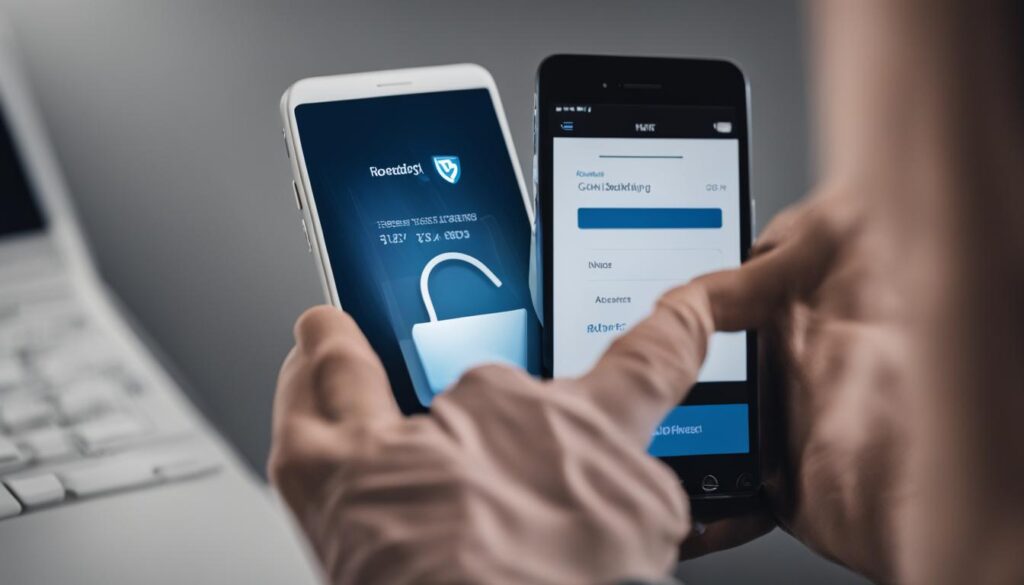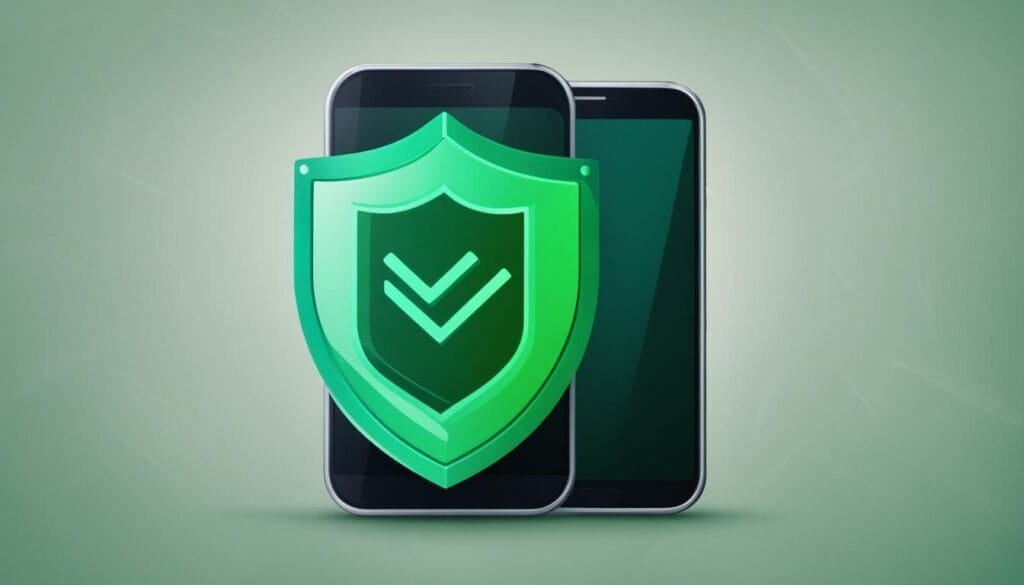If you have fallen victim to a mobile banking scam, it is important to report the fraud promptly. Gathering information like email addresses, receipts, and phone numbers associated with the scam will be helpful when filling out a report. Start by contacting your state consumer protection office and your local police department if you have lost money or possessions. Additionally, you can visit the Federal Trade Commission’s website at ReportFraud.ftc.gov to report the scam online. The FTC works to protect consumers and investigates cases of fraud. If your personal information was stolen, such as your Social Security number or credit card details, you can also go to IdentityTheft.gov to take specific steps to protect yourself. Finally, placing a fraud alert on your credit report can help to prevent further fraudulent activity in your name.
Key Takeaways:
- Reporting mobile banking fraud promptly is crucial for taking appropriate action.
- Gather all relevant information, such as email addresses and receipts, to fill out a detailed report.
- Contact your state consumer protection office and local police department to report the fraud.
- Use the Federal Trade Commission’s website, ReportFraud.ftc.gov, to report the scam online.
- If personal information is stolen, visit IdentityTheft.gov for specific steps to protect yourself.
Steps to Report Mobile Banking Fraud
When it comes to reporting mobile banking fraud, taking the right steps is essential to ensuring that the scam is properly investigated and the necessary actions are taken. By following these steps, you can play an active role in identifying the fraud, holding the scammers accountable, and protecting yourself from future incidents.
Gathering Information
The first step in reporting mobile banking fraud is to gather all the relevant information about the scam. This includes email addresses, receipts, phone numbers, and any other evidence you may have. Providing this information to the authorities will be crucial in their investigation.
Contacting Authorities
Once you have gathered the necessary information, it’s time to report the fraud to the appropriate authorities. Contact your state consumer protection office and local police department to file a report. They will guide you on the necessary steps and actions to take.
Utilizing Government Resources
Government resources can also provide valuable support when reporting mobile banking fraud. The Federal Trade Commission (FTC) has an online platform, ReportFraud.ftc.gov, where you can report scams. Additionally, if your personal information has been stolen, visit IdentityTheft.gov for specific steps to protect yourself.
Placing a Fraud Alert
In addition to reporting the fraud, it is advisable to place a fraud alert on your credit report. This will help monitor any suspicious activity and prevent further fraudulent transactions in your name.
By following these steps, you can contribute to the investigation and prevention of mobile banking fraud. Remember, reporting fraud promptly not only helps in identifying scammers but also protects yourself and others from falling victim to similar incidents.
Protecting Yourself from Mobile Banking Scams
As cybercrime continues to evolve, it is crucial to take proactive measures to protect yourself from mobile banking scams. Scammers employ various tactics, such as phishing emails and text messages, to trick individuals into revealing their personal and financial information. By being aware of common scams and following some key precautions, you can enhance your security and safeguard against potential security breaches.
Recognizing Phishing Attempts
Phishing is a fraudulent practice where scammers impersonate legitimate companies or organizations to trick individuals into sharing sensitive information. To identify phishing attempts, be cautious of unexpected messages asking for personal or financial details. Scrutinize the sender’s email address or phone number, as scammers often use slight variations to imitate trusted sources. Watch out for messages with urgent claims or requests, such as account problems or the need to verify information. Legitimate companies usually don’t ask for sensitive information via email or text.
Taking Precautions
- Avoid clicking on links or downloading attachments from unknown sources, as they can contain malware or lead to fake websites designed to steal your information.
- Install reputable security software on all your devices and keep it regularly updated to detect and prevent security threats.
- Enable multi-factor authentication whenever possible. This adds an extra layer of security by requiring additional verification steps, such as a unique code sent to your mobile device.
- Back up your data regularly to protect against potential data breaches or ransomware attacks. Cloud storage or external hard drives are good options.
It’s important to stay vigilant and be cautious of any suspicious communications or requests for personal information. By following these precautions, you can minimize the risk of falling victim to mobile banking scams and protect your financial assets.
Remember, scammers are constantly adapting their methods, so it’s crucial to stay informed about emerging threats and evolving security practices. By maintaining awareness and implementing these precautions, you can help protect yourself and ensure a safer digital banking experience.

The Impact of Mobile Banking Fraud
Mobile banking fraud can have significant negative consequences for victims. When scammers successfully obtain personal and financial information, they can gain unauthorized access to email accounts, bank accounts, and other sensitive digital platforms. This puts victims at risk of identity theft, financial loss, and damage to their personal reputation. The impact of mobile banking fraud goes beyond immediate financial harm; it can disrupt victims’ lives, create emotional distress, and undermine their trust in online banking systems.

Reporting mobile banking fraud is crucial for initiating investigations and holding scammers accountable for their actions. By promptly reporting the fraud, victims contribute to the prevention of future scams and protect themselves and others from similar incidents. Reporting the fraud to the appropriate authorities, such as state consumer protection offices, local police departments, and the Federal Trade Commission (FTC), helps build a database of fraud cases. This information allows authorities to identify patterns and trends, raise public awareness about common scams, and develop strategies to counter fraud.
Reporting mobile banking fraud plays a crucial role in identifying scammers, bringing them to justice, and protecting oneself and others from future incidents.
Additionally, reporting mobile banking fraud enables authorities to conduct thorough investigations and take legal action against scammers, deterring them from further criminal activities. It contributes to the collective effort of combating cybercrime and maintaining trust in the banking system. By reporting mobile banking fraud, individuals help safeguard their financial assets, maintain their personal privacy, and preserve the integrity of the banking industry.
The Role of Reporting Mobile Banking Fraud
Reporting mobile banking fraud serves as a critical tool in the fight against scams and fraudulent activities. It helps to identify and track scammers, leading to their apprehension and prosecution. By reporting fraud, individuals contribute to the ongoing efforts of law enforcement agencies, financial institutions, and consumer protection organizations in safeguarding the interests of the public.
The process of reporting mobile banking fraud not only protects individual victims but also has a broader impact on society. The data collected from fraud reports allows authorities to identify trends and patterns, enabling them to target and disrupt criminal networks. Additionally, reporting fraud can raise awareness among the public and educate them about the latest scam techniques and prevention measures.
In summary, reporting mobile banking fraud is an essential step in combating cybercrime, protecting oneself and others from financial loss, and maintaining trust in the banking system. By promptly reporting scams to the appropriate authorities, individuals play an active role in preventing future incidents and helping law enforcement agencies bring scammers to justice.
| Benefits of Reporting Mobile Banking Fraud: | Impact on Individuals: |
|---|---|
| Contributes to the prevention of future scams | Protects financial assets |
| Aids in the identification and apprehension of scammers | Maintains personal privacy |
| Raises public awareness about common scams | Preserves the integrity of the banking industry |
| Collects data to identify trends and patterns | Helps law enforcement target and disrupt criminal networks |
Government Resources for Reporting Mobile Banking Fraud
When it comes to reporting mobile banking fraud, it is crucial to utilize the resources provided by government authorities. In the United States, there are several avenues you can explore to report fraud and seek assistance.
Contact your state consumer protection office: Your state consumer protection office is a valuable resource for reporting mobile banking fraud. They can guide you through the process, provide advice, and take appropriate action against scammers.
Local police departments: If you have lost money, possessions, or personal information as a result of a mobile banking scam, it is recommended to reach out to your local police department. They can file an official report and assist in the investigation of the fraud.
The Federal Trade Commission (FTC): The FTC plays a significant role in protecting consumers from scams and fraudulent activities. Their website, ReportFraud.ftc.gov, provides an online platform where you can report mobile banking fraud. The information you provide can help the FTC investigate and take legal action against scammers.
IdentityTheft.gov: If your personal information has been stolen and you suspect identity theft, visit IdentityTheft.gov for step-by-step guidance on protecting yourself. This website offers valuable resources to help you recover and safeguard your identity.
Conclusion
When you encounter mobile banking fraud, it is essential to take immediate action to protect yourself and others. By utilizing government resources such as state consumer protection offices, local police departments, the FTC, and IdentityTheft.gov, you can report the fraud and contribute to the investigation and prevention of scams. Remember, reporting mobile banking fraud is not only crucial for your own protection but also for maintaining trust in the banking system and combating cybercrime.
Educating Yourself on Reporting Mobile Banking Fraud
When it comes to reporting mobile banking fraud, it is essential to be well-informed about the protocols and procedures involved. This knowledge will help you navigate through the reporting process more effectively and increase the likelihood of a successful investigation. While this article provides general guidance, it is important to confirm these protocols with your specific service provider for accurate and up-to-date information.
Proper education on reporting fraud starts with understanding the steps involved. By familiarizing yourself with the process, you can ensure that you have all the necessary information and documentation to assist authorities in their investigation. This includes gathering relevant details such as email addresses, receipts, and phone numbers associated with the scam. Having this information readily available will streamline the reporting process and provide investigators with valuable leads.
In addition to understanding the reporting steps, it is crucial to know who to reach out to for assistance. Your service provider’s customer support team can provide guidance on reporting fraud and may have dedicated resources to handle such incidents. They can help direct you to the appropriate authorities and ensure that your report is properly documented and investigated.
Lastly, staying informed about common fraud trends and scams is essential for protecting yourself and others. By keeping up to date with the latest threats, you can recognize potential risks and take proactive measures to strengthen your security. Regularly reviewing educational resources provided by your bank or financial institution can help you stay one step ahead of scammers and minimize the risk of falling victim to mobile banking fraud.
Summary:
- Educate yourself on the protocols and procedures involved in reporting mobile banking fraud.
- Understand the steps of the reporting process and gather all necessary information.
- Reach out to your service provider’s customer support team for guidance and assistance.
- Stay informed about common fraud trends and scams to protect yourself from potential risks.
The Role of Reporting Mobile Banking Fraud
Reporting mobile banking fraud plays a crucial role in identifying scammers, bringing them to justice, and protecting oneself and others from future incidents. When individuals report scams, it helps in building a database of fraud cases, allowing authorities to identify patterns and trends. This information can be used to educate the public about common scams, raise awareness, and develop strategies to counter fraud. Additionally, reporting fraud enables authorities to conduct investigations and take legal action against scammers, deterring them from further criminal activities. By reporting mobile banking fraud, individuals contribute to the collective effort of combating cybercrime, protecting financial assets, and maintaining trust in the banking system.
Furthermore, reporting mobile banking fraud is essential in providing valuable insights to banks and financial institutions. By sharing details of the scams, banks can analyze the methods used by scammers and strengthen their security systems. This allows them to proactively implement measures to prevent similar frauds in the future, safeguarding their customers’ assets.
In addition to the direct impact on individuals and financial institutions, reporting mobile banking fraud also serves the larger purpose of safeguarding customer service. When scams are reported, banks can review their customer service protocols and policies to address any loopholes or vulnerabilities that scammers may exploit. This helps in enhancing customer experience and maintaining trust in the banking industry as a whole.
The Importance of Reporting Fraud
The consequences of mobile banking fraud can be severe and long-lasting. By reporting fraud promptly, individuals not only protect themselves from further financial loss but also help in preventing others from falling victim to the same scams. It is crucial to remember that reporting fraud is more than just a personal responsibility—it is a way of combating cybercrime and ensuring a safer banking experience for everyone.

| Benefits of Reporting Mobile Banking Fraud | Actions |
|---|---|
| Identification of Scammers | Authorities can use reported fraud cases to identify scammers and track their activities. |
| Educating the Public | Reporting fraud helps raise awareness about common scams and tactics used by scammers. |
| Developing Strategies | Analyze reported fraud cases to develop strategies and preventive measures against future scams. |
| Enhancing Bank Security | Banks can strengthen their security systems by learning from reported cases of fraud. |
| Protecting Customer Service | Reporting fraud helps banks improve their customer service protocols to prevent future scams. |
Conclusion
Reporting mobile banking fraud is a critical step in combating cybercrime and safeguarding against financial loss and identity theft. By promptly reporting scams and providing relevant information, individuals can contribute to the investigation and prevention of fraudulent activities. It is essential to stay informed about common scams and phishing tactics to effectively recognize potential threats and take proactive measures to enhance security.
Utilizing government resources such as state consumer protection offices, local police departments, and the Federal Trade Commission’s reporting platform, individuals can seek assistance and report fraud instances. By doing so, they not only protect themselves but also help in building a database of fraud cases, raising public awareness, and developing strategies to counter fraud.
Remember to confirm the reporting protocols with your specific service provider for accurate and up-to-date information. By following these steps and remaining vigilant, individuals can actively contribute to the fight against cybercrime, ensuring financial protection and maintaining trust in the banking system.
FAQ
What should I do if I have fallen victim to a mobile banking scam?
It is important to report the fraud promptly. Gather information like email addresses, receipts, and phone numbers associated with the scam. Contact your state consumer protection office, local police department, and visit ReportFraud.ftc.gov to file a report.
How can I protect myself from mobile banking scams?
Be aware of common phishing tactics and take precautions. Be cautious of unexpected emails or messages asking for personal or financial details, avoid clicking on links from unknown sources, install security software, utilize multi-factor authentication, and back up data regularly.
What are the consequences of falling victim to mobile banking fraud?
Scammers can gain unauthorized access to accounts and use personal information for identity theft or financial theft. This can result in financial loss, compromised credit, and damage to personal reputation.
Which government resources can I use to report mobile banking fraud?
Contact your state consumer protection office, local police department, and report scams online at ReportFraud.ftc.gov. Visit IdentityTheft.gov if your personal information was stolen.
How can I educate myself on reporting mobile banking fraud?
Educate yourself on the proper protocols and procedures by confirming with your specific service provider. Stay informed about common scams and fraud trends to identify potential threats and take proactive measures.
What role does reporting mobile banking fraud play?
Reporting fraud helps in identifying scammers, initiating investigations, and holding them accountable. It also builds a database of fraud cases, educates the public, and enables authorities to take legal action and prevent future scams.
How can I conclude my report on mobile banking fraud?
Reporting fraud effectively involves gathering information, contacting the appropriate authorities, and utilizing government resources. By following these steps, individuals can contribute to the investigation and prevention of fraud, protecting their finances and personal information.
What Security Breaches Should I Look for When Reviewing Bank Statements?
When reviewing bank statements for breaches, it’s essential to watch out for unauthorized transactions, such as unfamiliar purchases or withdrawals. Additionally, keep an eye on irregularities like duplicate or missing transactions, as they may signify a security breach. Promptly reporting any suspicious activity to your bank enhances the chances of resolving the issue swiftly and protecting your financial security.

